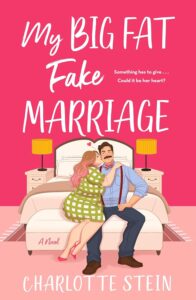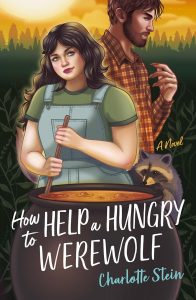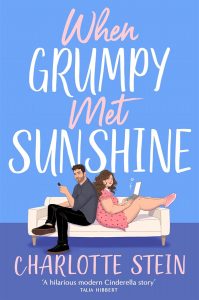I’m over at Dear Author with a review of My Big Fat Fake Marriage by Charlotte Stein. A funny, sweet and sexy romance with a nod to Ted Lasso.
Tag: Charlotte Stein (Page 1 of 2)
I’m over at Dear Author with a review of How to Help a Hungry Werewolf by Charlotte Stein. Funny and sexy story with delightful worldbuilding.
I’m over at Dear Author with a review of When Grumpy Met Sunshine by Charlotte Stein. This one had me laughing out loud most of the way through the book.
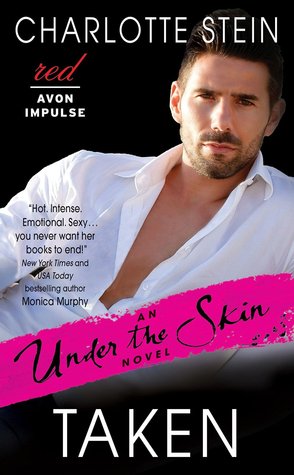 Why I read it: I enjoy this author’s books so I bought it on release day. Charlotte Stein and I follow each other on Twitter and chat occasionally. I think she’s lovely. If I didn’t think I could be objective about her books, I wouldn’t review them. But readers may wish to take the foregoing into account.
Why I read it: I enjoy this author’s books so I bought it on release day. Charlotte Stein and I follow each other on Twitter and chat occasionally. I think she’s lovely. If I didn’t think I could be objective about her books, I wouldn’t review them. But readers may wish to take the foregoing into account.
What it’s about: (from Goodreads) It was just a prank I didn’t want to be a part of. I never meant to hurt anyone, least of all Johann Weir. You wouldn’t know that he sells literature for a living. He has these wild eyes—eyes that light something up in me—and he must be twice as big as I am, with strong, warm hands. Hands I try not to imagine everywhere.
He scares me. And thrills me.
But now the deed is done, and I have to face the consequences. He says he just wants to hold me here until the police come, but it’s been hours and I’m still here.
Chained to a pipe in his back room like a prisoner.
The only person I have to talk to is Johann, and I tell him dark, shameful secrets—secrets that involve the metal around my wrist and him standing over me. But I can’t stop. I need him to know everything. I need him.
Johann has his own secrets—ones he wants to tell me too. And more than anything, I want to listen. And maybe, before he sends me away, he’ll punish me.
Just a little.
Just enough.
What worked for me (and what didn’t): As is most often the case with auto-buy authors, I didn’t bother reading the blurb. When I saw someone excitedly tweeting about it, I took a skim and saw “chained to a pipe like a prisoner” and thought – oh, this must be some sort of sexy game. Um, not so much. The book begins in a dark place. It doesn’t stay there long and Han’s actions after his initial blunder (blunder is not the right word – what he did was way worse than a blunder), are honourable. It is also true to say that all of the sexual contact in this book is entirely consensual. In fact, Rosie is the aggressor in the sense that she has to actively persuade Han to do anything at all. Once the doing gets going, the tables turn, but Han does not make a sexual move without Rosie’s enthusiastic consent. Which is all to the good because his first actions did not make me warm to him. Picking up a woman and chaining her in your basement is not cool. It is so far beyond not cool, I can’t fully describe it. Yes, he initially isn’t thinking clearly and yes, his plan (such as it was) was merely to “restrain” her until the police arrived (her friend was about to set fire to precious first editions in his antiquarian bookshop and Rosie was ‘helping’ her by not actively stopping her) but, let me make this clear: it is not cool to pick up a woman and chain her in your basement*. Continue reading
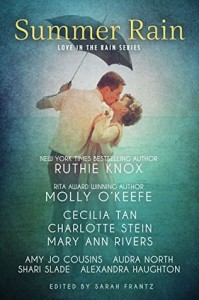 Why I read it: This book of “novelettes” contains offerings by some of my favourite authors and proceeds go to a worthy cause.
Why I read it: This book of “novelettes” contains offerings by some of my favourite authors and proceeds go to a worthy cause.
I decided to review Real Feelings separately for a couple of reasons:
1. The review for the entire anthology was way too long and the section about Real Feelings was the longest individual bit.
2. I had lots of thoughts about the story which I wanted to tease out separately to the other novelettes in the anthology.
What it’s about: (from Goodreads) What happens when love gets caught in the rain?
In this romance anthology, RITA-Award winning author Molly O’Keefe shows us the power of a city thunderstorm from the top of a skyscraper, while Amy Jo Cousins soaks us in a rain in Spain. New York Times bestselling author Ruthie Knox’s heroine is devastated by a winter storm, while a summer thunderstorm grants Alexandra Haughton’s hero and heroine a second chance at love. Rain sparks self-awareness in the robot in Charlotte Stein’s story and allows Mary Ann Rivers’s heroine to fall in love with her hero and her own art. Rain causes romance between the college students in Audra North’s and Shari Slade’s stories, while romance causes rain in Cecilia Tan’s myth-inspired tale of a sacrifice to a demi-god. Nine romance novelettes, edited by Sarah Frantz.
All proceeds from the volume will be donated to the Rape, Abuse, and Incest National Network (www.rainn.org), the largest anti-sexual violence organization in the United States
What worked for me (and what didn’t): What a fascinating concept this story had. Set some unspecified time in the future, a woman buys an android, basically as a sex toy. But when she turns him on (heh) she finds that issues of will and consent are important and she struggles with the morality of their “relationship”. He was programmed to serve her in any capacity she wishes. He has no free will, She literally owns him. The Dear Reader note at the front indicates that Ms. Stein wanted to explore these kinds of issues in a “safe” kind of way and it is a very novel idea indeed. Moira feels so uncomfortable with her power over her android, she does not immediately seek a sexual relationship with him – even though that’s what she bought him for. I suppose it is spoilerish to say that the android (who calls himself Michael), becomes sentient but I felt it was the intention of the plot all along so I don’t feel major qualms about letting it slip here. (Also, the blurb gives it away.) And it is in this aspect I found the most things to ponder and talk about anyway. Michael says:
“The more I saw you angry at the idea of owning me, the more I imagined deciding for myself. The more I became Michael. You made it all right for me to become Michael.”
 Why I read it: This book of “novelettes” contains offerings by some of my favourite authors and proceeds go to a worthy cause. Which is a bonus but not why I bought it. (Does that make me a bad person?)
Why I read it: This book of “novelettes” contains offerings by some of my favourite authors and proceeds go to a worthy cause. Which is a bonus but not why I bought it. (Does that make me a bad person?)
What it’s about: (from Goodreads) What happens when love gets caught in the rain?
In this romance anthology, RITA-Award winning author Molly O’Keefe shows us the power of a city thunderstorm from the top of a skyscraper, while Amy Jo Cousins soaks us in a rain in Spain. New York Times bestselling author Ruthie Knox’s heroine is devastated by a winter storm, while a summer thunderstorm grants Alexandra Haughton’s hero and heroine a second chance at love. Rain sparks self-awareness in the robot in Charlotte Stein’s story and allows Mary Ann Rivers’s heroine to fall in love with her hero and her own art. Rain causes romance between the college students in Audra North’s and Shari Slade’s stories, while romance causes rain in Cecilia Tan’s myth-inspired tale of a sacrifice to a demi-god. Nine romance novelettes, edited by Sarah Frantz.
All proceeds from the volume will be donated to the Rape, Abuse, and Incest National Network (www.rainn.org), the largest anti-sexual violence organization in the United States.
Note: Some of the stories deal with issues of abuse, sexual and otherwise and/or violence. Some readers might find them triggering to read/read about.
Redemption by Ruthie Knox: There is a “Dear Reader” letter in the front of each of the novelettes. Ms. Knox says Redemption is a sad story. And it is. Both Jessie and Mike are sad. They’ve been beaten down by life and are just about at the end of their respective ropes. Unfortunately and partly because the story is short, I found the characterisation, especially in relation to Mike to be a little thin and I didn’t see what attracted him to her and from her side of things, what made him someone more than she wanted to have sex with. Because for a year, they didn’t talk and he didn’t smile and they didn’t share anything important apart from some good sex and in the end, I didn’t buy the commitment because I didn’t see enough of those things within the story itself. The writing has a kind of haunting melancholy quality to it and there were parts which we quite lovely. Short stories often work better for me when they are about people who already know each other. But this story seemed to take pains to tell me they didn’t know each other that well really so I was left a little unconvinced.
